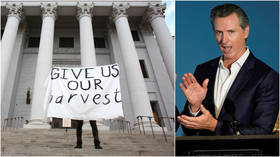Gov. Newsom approves task force on ‘slavery reparations’ as taxpayers wonder how ‘broke’ California will foot the bill

California’s Democratic Governor Gavin Newsom has approved the creation of a task force to examine paying reparations to the descendants of slaves, the first such proposal ever passed by a state government.
Newsom signed AB 3121 into law on Wednesday, creating a nine-member task force to study possible reparations for black Americans. While the governor lamented that the legislation hadn’t been passed “decades ago,” he hailed the bill for establishing a “paradigm that we hope will be resonant all across the United States.”
“This is not just about California, this is about making an impact, and a dent, across the rest of the country,” Newsom said moments after signing the bill.
CA just became the first state in the nation to mandate the study and development of proposals for reparations.Our past is one of slavery, racism, and injustice. Our systems were built to oppress people of color.It’s past time we acknowledge that. https://t.co/sY8UWffqzt
— Gavin Newsom (@GavinNewsom) September 30, 2020
While the bill itself commits the state to no particular payments, it will launch a task force to consider how reparations could be implemented in California. The task force is required to hold its first meeting by next June, and will submit its recommendations to the government one year later, which will not be binding.
The law also does not specify what form the reparations must take, proposing various alternatives to direct cash payments, such as forgiving student debt, financing job training or other public works projects.
Also on rt.com Precedent set: North Carolina city approves reparations for black Americans, Rhode Island mayor looking into doing the sameThough California is the first state government to pass such legislation, similar proposals have been floated by lawmakers in Texas, New York and Vermont, but none have yet passed. On a more local level, city administrations in both Asheville, North Carolina and Providence, Rhode Island approved measures related to reparations in July. Asheville City Council passed its plan unanimously, mandating payments in the form of public investments, while Providence Mayor Jorge Elorza signed an order vowing to create a framework for reparations in the future.
California’s history with slavery is somewhat ambiguous. While the state constitution explicitly prohibits both “slavery” and “involuntary servitude,” records suggest chattel slavery was largely practiced in the open – namely after the gold rush of the mid-1800s, which brought thousands of white settlers out west, many bringing slaves with them.
“California has come to terms with many of its issues, but it has yet to come to terms with its role in slavery,” said Assemblywoman Shirley Weber (D-San Diego), who authored the reparations bill. “We’re talking about really addressing the issues of justice and fairness in this country that we have to address.”
Newsom’s decision to sign the proposal into law was hailed by a number of locals, including rapper and LA native Ice Cube, who thanked the governor for giving it the green light.
Thank you Governor @GavinNewsom for signing AB3121 https://t.co/PKUcMtXb69 and Thank you @ADOSLosAngeles for bringing the bill to my attention so we could push from all angles.
— Ice Cube (@icecube) September 30, 2020
Thank you for signing this Governor. It's about time we reflect on past errors and seek to make amends.
— CobiWan23🌹 (@CoderaThe1) September 30, 2020
Some residents were up in arms over the bill, however, questioning whether it would “change the past,” while others insisted they would not pay reparations for historical abuses they find abhorrent and had no role in.
“Respectfully, how will this change the past or help the future? Will the indigenous people of this state receive reparations? They seem first in line in my books!” one netizen wrote.
I have not had slaves nor do I support it.I will not pay for anyones reparations.
— It's Nameless, SirNameless. (@Sir_Nameless_) September 30, 2020
Reparations will be the last straw for me. If this even looks possible I will take my family to a new state
— Dale (@coachdale07) September 30, 2020
Other critics noted that despite the fact California is already “broke” – while also dealing with widespread homelessness, power outages and rampant wildfires, among other issues – the governor still “can't spend taxpayers’ cash fast enough.”
Newsom announces that California is going to consider paying reparations for dependents of slaves. Is this a decision supported by California residents or an arbitrary act ramrodded by Newsom? Never mind California was a free state. They can't spend taxpayers cash fast enough.
— David Beckley (@dfbeck44) September 30, 2020
California is broke and homeless on fire and can barely keep the lights on but they have time and money for reparations to those who never suffered slavery. RECALL YOUR GOVERNOR OR YOUR STATE WILL BE FOREVER LOST!
— Ligh⭐ of ⭐he S⭐ar (@LightoftheStar) October 1, 2020
Think your friends would be interested? Share this story!















